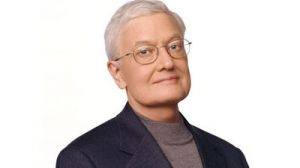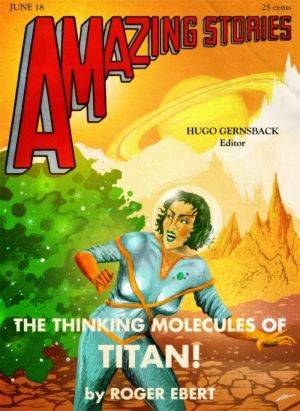
There’s really no overstating the impact Roger Ebert has had on Champaign-Urbana, film criticism, and filmmaking itself. As EbertFest, the C-U area’s celebration of some of Ebert’s favorite (sometimes overlooked) films looms large, we at Smile Politely wanted to draw attention to another Ebert-related film—this one based on a story Ebert himself wrote.
Or mostly wrote.
The Thinking Molecules of Titan is a local film adaptation of a short story Roger Ebert began writing in his final hospitalized days but never finished. It was intended as an homage to the adventure stories Ebert loved in his youth, and its unfinished nature created an amazing opportunity for some local creative talents.
Andrew Stengele and Patrick Wang adapted the story—to which Stengele had crafted an ending—into a screenplay, and a film project was officially born. Using Champaign-Urbana locations as their backdrop, they began shooting a film in February with local actors Lindsey-Gates Markel, Malia Andrus, Joel Higgins, Donna Sant, and Mike Trippiedi.
Smile Politely’s Chike Coleman, a film lover and longtime fan of Ebert’s, spoke with Stengele about the project.
———
Smile Politely: What inspired you to finish this story written by Roger Ebert?
 Andrew Stengele (pictured, left): It started off as a contest on RogerEbert.com. Chaz Ebert posted the story on her blog and asked readers to finish the story. My initial thought was to adapt the winning entry, but as time passed, the idea of doing a separate ending grew on me.
Andrew Stengele (pictured, left): It started off as a contest on RogerEbert.com. Chaz Ebert posted the story on her blog and asked readers to finish the story. My initial thought was to adapt the winning entry, but as time passed, the idea of doing a separate ending grew on me.
SP: What made you decide to turn the short story into a short film?
Stengele: I’m not much of an author. So, I definitely leaned toward doing a film instead of a short story. It seemed fitting to make a tribute to Roger as a film, since he devoted his life to that medium.
SP: What was the production process like in putting the story to film?
Stengele: This was definitely the biggest film production I have worked on. There were many more people on set than I am used to (by a few orders of magnitude), and there were contracts that needed to be signed with the University since the story takes place on campus. Also, and perhaps most importantly, there was a pressure to succeed since this short is representing the Champaign-Urbana film community as a whole.
 SP: Did you receive any advice or encouragement from Ebert’s wife, Chaz?
SP: Did you receive any advice or encouragement from Ebert’s wife, Chaz?
Stengele: I got Chaz’s blessing and permission to do the short, but other than that, she hasn’t been too involved. She is extremely busy, especially because she has been promoting Life Itself—the documentary about Roger opening this year’s EbertFest—at festivals around the country. She seemed happy that we were making the film, though.
SP: Had you heard of those old adventure shorts that Ebert wrote about before you began working on the short? If you hadn’t heard of them before, what research did you do to prepare for finishing the project?
Stengele: You could tell that Roger was a bit of a sci-fi fan just from reading some of his reviews, but as for his writing adventure shorts, that was sort of news to me. My co-writer Patrick Wang (whose film In the Family played at last year’s Ebertfest) and I did some research for the project, but not really into adventure shorts. There wasn’t any action in Roger’s story, and we tried to keep the feel of what he had started. We did a lot of digging into Titan and various things mentioned in the story that we thought Roger might have intended to be thematically relevant later on.
 SP: What do you want the audience to take away from viewing the short?
SP: What do you want the audience to take away from viewing the short?
Stengele: I just hope they like it, and, mainly, I hope Chaz likes it. She’ll be the primary indicator and whether or not we did Roger’s story justice.
SP: What does EbertFest mean to you?
Stengele: EbertFest is my big event every year. I am in charge of the live-streaming and archiving of the introductions, Q&As, and panel discussions. So, I am at the festival pretty much from the moment I wake up until I go to sleep every day.
SP: What would you say Ebert’s impact on film and filmmaking is?
Stengele: Roger taught people how to think about film. Just listen to any panel from the festival, and you will hear the filmmakers say how they loved reading Roger’s reviews and insights. He may not have influenced the technical aspects of filmmaking, but he certainly showed people how to tell a story.
———
For more information on this project, visit the film’s website.








